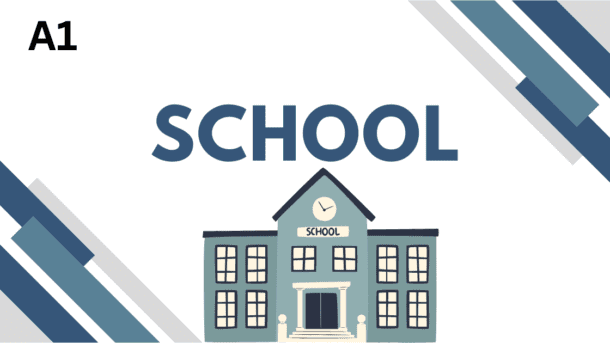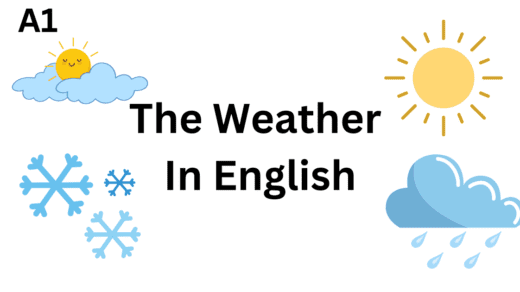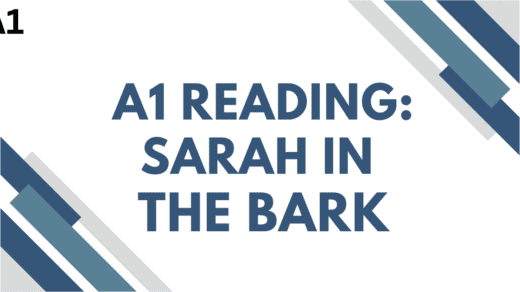Schools are a fundamental part of our lives, serving as places of learning, social interaction, and personal development. For English language learners, discussing school-related topics can enhance vocabulary and communication skills.
Vocabulary Building
Here is a comprehensive list of vocabulary:
- School-related Vocabulary:
- Classroom – The room where lessons take place.
- Subjects – Areas of study (e.g., Mathematics, Science, History).
- Teacher – A person who helps students learn.
- Homework – Tasks assigned to students to complete at home.
- Recess – A break period for students to play and relax.
- Report card – A report showing a student’s progress and grades.
- Extracurricular activities – Activities outside the regular curriculum (e.g., clubs, sports).
- Textbook – A book containing the essential material for a subject.
- Grade – A measure of a student’s performance in a subject.
- Timetable – A schedule of classes and activities.
- Descriptive Adjectives:
- Engaging
- Challenging
- Enjoyable
- Boring
- Useful
- Interactive
- Phrases related to school:
- “I have a lot of homework to do.”
- “We have a math test next week.”
- “My favorite teacher is Mrs. Smith because she makes learning fun.”
- “Our school offers a variety of extracurricular activities.”
- “My favorite subject is…”
- “I enjoy it because…”
- “I find it interesting because…”
Talking About Your School Experience
Now, let’s talk about your school experience. Can you tell me about your favorite subject or teacher? What made them so special? Perhaps it was the way they explained complex concepts or the support they offered outside of class.
Some questions to consider:
- What’s your favorite subject, and why do you enjoy it?
- Who’s your favorite teacher, and what makes them stand out?
- What’s the most challenging part of your school day?
- Do you have any favorite school memories or traditions?
School Facilities and Resources
Schools offer a range of facilities and resources to support student learning and well-being. Let’s explore some of these:
- Library: What kind of resources does your school library offer? Are there any favorite books or authors you’ve discovered?
- Computer lab: Do you have access to computers or tablets in your school? How do you use them for learning?
- Sports facilities: Are there any sports teams or clubs at your school? What kind of equipment or facilities are available?
- Cafeteria: What kind of food is served in your school cafeteria? Do you have any favorite meals or snacks?
Consider the following questions:
- How do you think schools can improve their facilities and resources?
Extracurricular Activities
Extracurricular activities play a significant role in school life, offering opportunities for students to develop new skills, make friends, and have fun. Let’s discuss some popular activities:
- Sports teams: Are you part of a sports team, or do you enjoy watching games?
- Clubs: What kind of clubs are available at your school, such as music, drama, or debate?
- Volunteer work: Are there any opportunities for students to get involved in community service or volunteer work?
Reflect on the following questions:
- What’s your favorite extracurricular activity, and why do you enjoy it?
- How do you think extracurricular activities can benefit students?
- Are there any activities or clubs that you’d like to see introduced at your school?
Discussion Questions
- What do you enjoy most about school?
- Answer Example: I enjoy learning new things and spending time with my friends.
- What challenges do you face at school?
- Answer Example: I struggle with math sometimes, but I always ask for help.
- How do you feel about homework?
- Answer Example: I think homework is important, but too much can be overwhelming.
- What extracurricular activities are you involved in?
- Answer Example: I’m part of the school soccer team and the art club.
- How do you think schools could improve?
- Answer Example: Schools could offer more hands-on learning experiences and field trips.
- If you could change one thing about your school, what would it be?
- Answer Example: I would add more computers in the library.
- What is one memory you have from school that makes you smile?
- Answer Example: I remember our field day when everyone participated in fun games.
More Discussion Questions related to school:
- What is the role of a teacher in your school?
- How do you feel about homework? Is it helpful or not?
- What are some extracurricular activities you participate in?
- How do you prepare for examinations?
- What is your favorite subject and why?
- Can you describe a memorable school event?
- How do you feel about group projects?
- What role do teachers play in your learning?
Additional Vocabulary and Phrases:
To further enhance the lesson, you may add these vocabulary and phrases:
- Education system
- Study groups
- Report card
- Discipline
- Classmate
- “I enjoy participating in school clubs because they help me learn new skills.”
- “Studying with friends helps me understand difficult topics.”
- “I believe every student should have access to quality education.”
#1 Sample dialogue:
A: “Hi! How was your day at school?”
B: “It was good! I had Math first. What about you?”
A: “I had English. We did a fun project!”
B: “That sounds great! Did you have lunch together?”
A: “Yes, I ate with my friends in the cafeteria.”
B: “I love our cafeteria food!”
#2 Sample speaking dialogue
Teacher: “What’s your favorite fruit, John?”
John: “I love eating apples, they’re so juicy and sweet.”
Teacher: “That’s great! Apples are a good source of fiber. Have you tried any other fruits recently?”
John: “Yes, I had a banana and an orange in my lunch yesterday. But I’ve never tried a pomegranate, what does it taste like?”
Teacher: “Pomegranates are a bit tart, but they’re very nutritious. Maybe we can bring some to class next week and try them together.”
Student 2: “I love pomegranates! My mom buys them from the market every week.”
Teacher: “That’s wonderful! Class, can anyone tell me the names of some other fruits that are in season right now?”
Tips for studying and practicing speaking about school in English:
- Vocabulary Building: Start by compiling a list of school-related vocabulary (e.g., subjects, school items, routines). Use flashcards to memorize terms.
- Listening Practice: Listen to podcasts, videos, or dialogues about school experiences to familiarize yourself with pronunciation and context.
- Reading: Read articles or stories related to school life, focusing on understanding context and identifying new vocabulary.
- Role-play: Engage in role-playing scenarios (e.g., a conversation with a teacher or discussing homework with a friend) to practice speaking in context.
- Recording Practice: Record yourself speaking about your school experiences and listen for areas of improvement, such as pronunciation and fluency.
- Conversation Partners: Find a language exchange partner or join a speaking club to practice talking about school, allowing real-time feedback.
Conclusion
In this speaking lesson, students will discuss various aspects of their school experience, including their favorite subjects, teachers, extracurricular activities, and challenges they face. By discussing favorite subjects, memorable moments, and challenges, you will develop confidence in expressing your thoughts while appreciating the rich tapestry of school life. Encourage them to keep using English in their daily interactions to strengthen their communication skills even further.
Study these lessons:
Daily Routine : A Comprehensive Guide for English Learners
The Weather In English
Free Time Activities In English
Talking About Hobbies and Interest
Family Members: A Comprehensive Guide for English Learners
Giving Personal Information In Eanglish
Pronouns ( Comprehensive Guide To Pronouns)
Articles ( A, An, The ) A COMPREHENSIVE GUIDE




